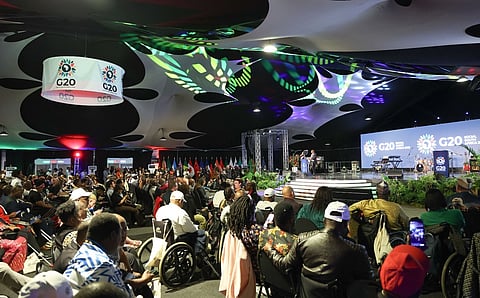

A report launched by Greenpeace International has revealed insufficient climate ambition in the 2035 nationally determined contributions (NDCs) submitted by G20 countries.
The report, titled 2035 Climate Ambition Gap, was released at the 30th Conference of the Parties (COP30) to the United Nations Framework Convention on Climate Change in Belem on November 17. The release was part of Greenpeace’s call for governments to agree on a Global Response Plan and ensure the 1.5°C limit remains in reach.
Countries have made collective commitments to limit the global temperature rise to 1.5°C, to reduce emissions by 60 per cent by 2035, to triple renewable energy and double energy efficiency by 2030, and to transition away from fossil fuels.
By the middle of COP30, however, many countries had not submitted new targets. Those that did, presented plans that collectively do not meet expectations.
G20 countries, especially the developed countries among them responsible for the vast majority of global greenhouse gas (GHG) emissions and the bulk of fossil fuel consumption, are failing to present adequate targets and measures.
According to the report, these major emitters account for almost 80 per cent of current emissions and around 85 per cent of global gross domestic product. This gives their policies an outsized influence on global trade, investment and technology flows.
Of the G20 member states, Australia, Brazil, Canada, China, the EU, Indonesia, Japan, Russia, South Africa, Turkiye, the UK and the US have submitted a 2035 target. Two more countries (Mexico and South Korea) publicly announced their 2035 targets but have not officially submitted this to the UN yet.
Three G20 countries (Argentina, India and Saudi Arabia) have not (yet) submitted (nor announced) their NDC.
The Greenpeace analysis also assessed the energy-related content of G20 NDCs. None of them have credible plans to phase out the fuels driving the climate crisis, it found.
They lack both the necessary commitment to phase out fossil fuels as well as quantified targets for progress related to renewables and energy efficiency developments.
Countries will need to adopt a Global Response Plan to tackle the mitigation ambition gap and ensure substantial and equitable progress is made in reducing GHG emissions and phasing out fossil fuels, the report stated.
Currently, fossil fuel use is responsible for around 70 per cent of GHG emissions, and emissions from fossil fuel use have increased by more than 60 per cent since 1990.
“The 43 member countries of the G20, including the EU27 but excluding the African Union, made up for 77 per cent of emissions in 2023. When adding the 55 members of the African Union, the share would increase by only 5 per cent, highlighting the large discrepancy in the contribution of different countries (and continents),” the report added.
The 2035 targets submitted and announced by G20 countries would only lead to a reduction of 23-29 per cent of their emissions, compared to those in 2019.
This represents a serious shortfall compared to the global 60 per cent reduction agreed in the Global Stocktake only two years ago, stated the report.
Under the Global Stocktake, countries endorsed:
Deep, rapid and sustained reductions in global GHG emissions of 43 per cent by 2030 and 60 per cent by 2035 relative to the 2019 level
Reaching net zero carbon dioxide emissions by 2050
Tripling renewable energy capacity by 2030
Doubling the annual rate of energy efficiency improvements by 2030.
Jasper Inventor, Deputy Programme Director, Greenpeace International said: “We must ensure COP30 leads to urgent action to phase out fossil fuels and fast-track renewables. But it must also yield progress for crucially needed climate finance, including steps towards making polluters pay for climate damages and a just transition. COP30 must deliver an outcome that accelerates real action.”
Greenpeace has called on G20 countries to raise their ambition, with developed countries taking the lead, and to work together to coordinate global action grounded in equity and shared responsibility to achieve much deeper emissions reductions.